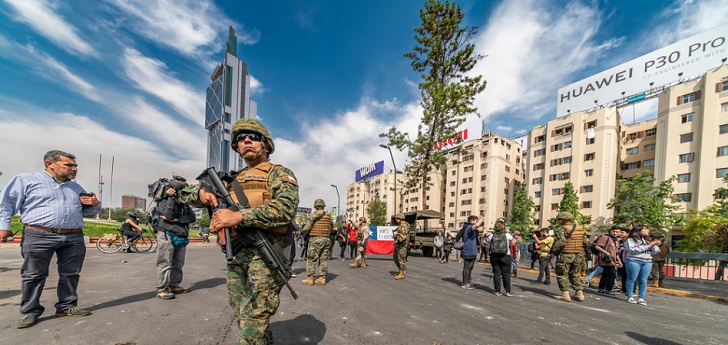Chile protests: Latin America’s retail pearl, on alert
The most stable country in the region is often chosen as a starting point in South American for many international fashion retailers.

One of the most stable economies in Latin America, with the most developed retail structures of the continent and local players that open the path for the whole region. Chile presents probably the best market conditions for those international retailers that want to enter the Latin American market. That’s why its often used as a home port in the region for dozens of corporations from around the globe. Now, the crisis originated in the rise of the subway’s tickets in its capital, Santiago, puts at risk the stability of a jewel for Latin American retail.
Chile has a population of 17.9 million inhabitants with a median age of 34.8 years old a low immigration rate. Urban population is about 87.6% of the total and is concentrated in Santiago, with 6.7 million people, and the cities of Valparaiso and Concepción, with 975,000 and 869,000 inhabitants, respectively.
The Gross Domestic Product (GDP) of the country stands at 452 billion dollars, similar to that of Austria, Hong Kong or Romania. GDP per capita is about 24,600 dollars, ahead of Mexico, Iran or Uruguay but below Croatia, Panama and Greece.
The Government is now promoting a “social agreement” with leaders of the different political parties
However, these wealth levels aren’t the key advantages Chile has for international fashion, but its large department stores like Falabella and Ripley. Born in the eighties, these distribution companies are present also in other Latin American countries like Peru, Colombia, Argentina, Brazil, Uruguay or Mexico, and are partners for many brands that enter the region without direct operations.
Chile is also a country open to international trade (With more than twenty agreements with other countries) and is one of the most stable economies in the region, although with a strong growth rate. According to the International Monetary Fund (IMF), Chile grew 4% in 2018, ahead of the 0.4% average of Latin America. In 2019, the country’s economy will slow down to 2.5%, but it will avoid the downwinds of other countries in South America.
An inflation of around 2% for 2018, 2019 and 2020, and an unemployment rate of between 7% and 6.9% are also symptomatic of the stability of a country that, in recent years, has attracted a great number of international retailers. Among those are H&M, Bestseller, Calzedonia, Louis Vuitton or Dolce&Gabbana.
Chile has a population of 17.9 million inhabitants with a median age of 34.8 years old a low immigration rate.
Thanks to copper, Chile has positive net exports, having China as a first client and supplier. The Asian country represents about 28% of the demand and 24% of Chilean imports. United States is the second in both cases, with 14.5% of the country’s exports and 18% of its imports.
The fashion sector, where international brands keep a high market share, generated in 2017 sales of 2.56 billion peso (355 million dollars), according to the National Statistics Office of the country.
If it were to last longer, the crisis that has exploded in the country could ruin part of the country’s attractive for international players. The protests originated with the raise of the subway’s ticket prices have resulted in roadblocks, burning of vehicles and looting with a balance so far as fifteen fatalities.
Sebastian Piñera’s government has reacted mobilizing the army and finally freezing the raise in the subway’s tickets. The Government is now promoting a “social agreement” with leaders of the different political parties in the country with the commitment of creating a more inclusive social architecture.


info@themds.com
Validation policy for comments:
MDS does not perform prior verification for the publication of comments. However, to prevent anonymous comments from affecting the rights of third parties without the ability to reply, all comments require a valid email address, which won’t be visible or shared.
Enter your name and email address to be able to comment on this news: once you click on the link you will find within your verification email, your comment will be published.